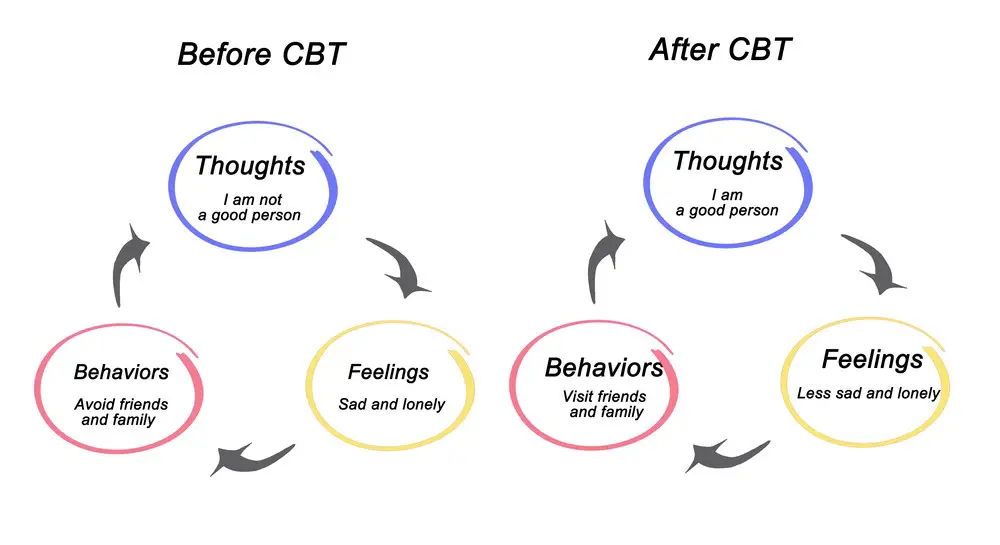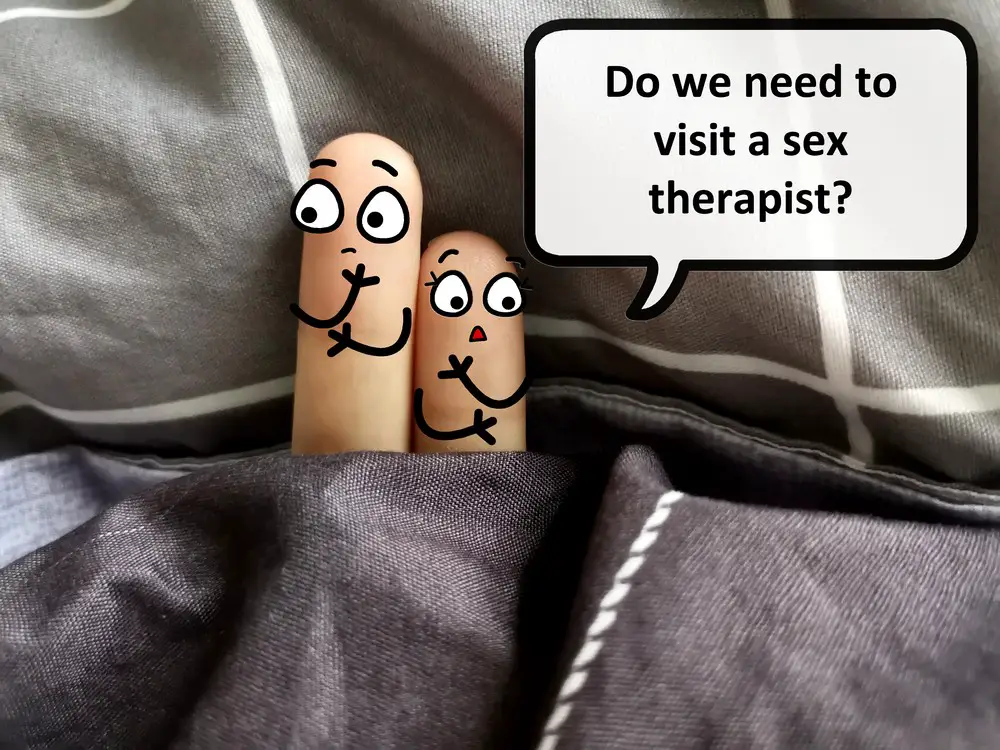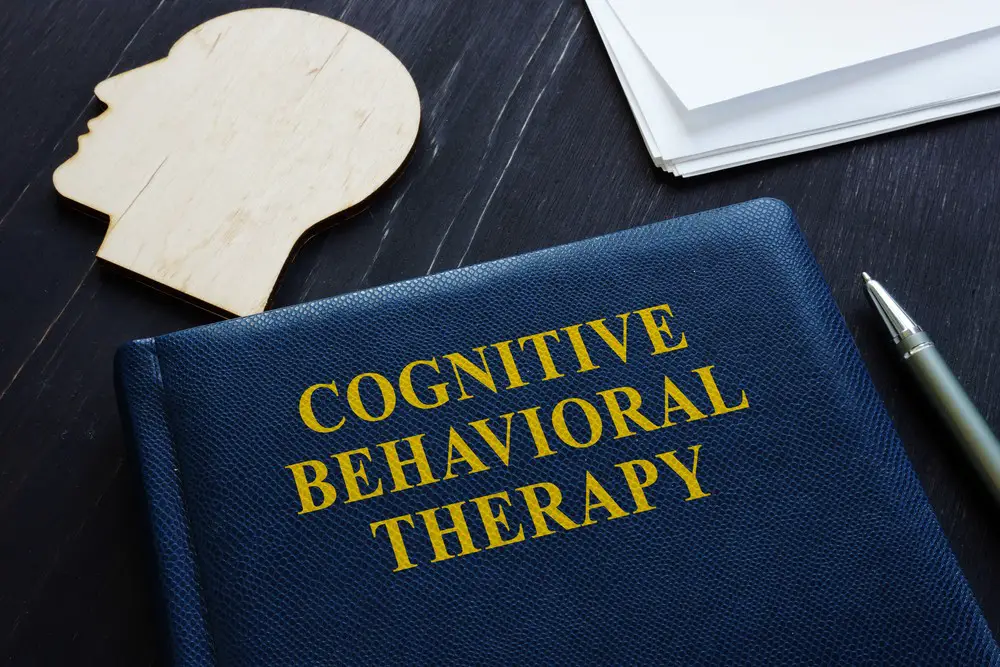As a BetterHelp affiliate, we receive compensation from BetterHelp if you purchase products or services through the links provided
Cognitive Behavioral Therapy (CBT) is a well-established therapeutic approach successfully applied to various psychological issues, including anxiety, depression, and behavioral concerns. An area that is less frequently discussed but highly relevant is the realm of human sexuality. As a complex and multifaceted aspect of human life, sexuality encompasses various elements, including sexual orientation, identity, pleasure, satisfaction, and overall sexual well-being.
In recent years, there has been a growing awareness of the importance of addressing sexual concerns in a therapeutic context. Many individuals struggle with their sexual identity, experience difficulties in their intimate relationships, or grapple with unhealthy sexual behaviors. CBT provides a valuable framework for addressing these issues and assisting individuals in understanding and embracing their sexuality healthily and satisfactorily.
CBT offers a variety of techniques and strategies that can be effectively tailored to address individual sexual concerns and needs. By working with a qualified sex therapist who is well-versed in CBT, individuals can gain the necessary tools to overcome their challenges, nurture their sexual well-being, and enhance their intimate relationships in a fulfilling way.
Key Takeaways
- CBT can be effectively applied to address various sexual concerns and improve overall sexual well-being
- Individuals can benefit from working with a qualified sex therapist using CBT techniques and strategies.
- Addressing sexual issues with CBT can enhance intimate relationships and personal satisfaction.
Understanding CBT and Sexuality

Cognitive-Behavioral Therapy
Cognitive-Behavioral Therapy (CBT) is a widely recognized psychological treatment that focuses on changing unhelpful thinking patterns, behaviors, and emotions. The beauty of CBT is that it’s practical and goal-oriented, providing clients with tools and strategies they can apply to their everyday lives.
Now, let’s mesh CBT with sexuality. At its core, sexuality is just as much a mental and emotional experience as a physical one. It’s no wonder, then, that there are connections between our mindsets, our emotions, and our intimate lives.
Sexuality and Its Aspects
Sexuality is a multifaceted concept encompassing various aspects, such as sex, gender, desire, and arousal. Our thoughts, feelings, and behaviors are all intertwined with our sense of self and how we express ourselves. People may experience challenges in any of these areas, and CBT comes in as a helping hand.
For example, some individuals may struggle with aspects of their sexual desire, battling feelings of inadequacy or frustration. They can benefit from CBT by uncovering and challenging negative beliefs they may have about themselves and their sexuality. Once these issues are addressed, it’s like a breath of fresh air; one might find a renewed sense of confidence and satisfaction in their intimate life.
Similarly, some folks may experience issues related to arousal or gender dysphoria. Their body and mind might adopt unhelpful thinking and behavior patterns as coping mechanisms. By recognizing these patterns and implementing effective strategies, CBT can empower such individuals and help them embrace their true selves.
In a nutshell, CBT and sexuality go hand in hand. Cognitive-Behavioral Therapy can pave the way for people experiencing challenges in their sexual lives, enabling them to overcome obstacles and rediscover a more fulfilling intimate life. So, let’s raise our glasses to the power of the mind and the beauty of human connection!

CBT for Sexual Concerns
Anxiety and Depression
When it comes to tackling sexual concerns, Cognitive Behavioral Therapy (CBT) can be a lifesaver. CBT can help manage anxiety and depression, which can often be intertwined with sexual issues. By learning the ropes to identify and reframe negative thoughts and patterns, individuals may experience relief from sexual anxiety, dampened mood, and that guilt-ridden cloud hovering over their love life.
Here’s the rundown on how CBT does its magic:
- Thoughts: Through CBT, one learns to spot unhelpful thoughts and beliefs about sex. This, in turn, enables them to adopt healthier perspectives and coping strategies.
- Emotions: CBT teaches how to manage and reduce those distressful emotions related to sexual concerns. This may include feelings of unworthiness, fear, or shame.
- Behaviors: By modifying negative thoughts and emotions, individuals can steer their behavioral patterns towards healthier and more fulfilling ones.

Sexual Dysfunction
CBT isn’t just about tackling anxiety and depression; it can also assist with specific sexual dysfunctions. These range from erectile dysfunction and premature ejaculation in men to vaginismus in women. Let’s break it down:
- Erectile Dysfunction: CBT can target performance anxiety, a big culprit behind this issue. Identifying stressors and reframing negative thoughts can help men rise to the occasion.
- Premature Ejaculation: By focusing on becoming more mindful of sensations and learning relaxation techniques, CBT can serve as a game-changer for those experiencing premature ejaculation.
- Vaginismus: CBT can help understand the underlying fears and beliefs contributing to vaginismus. This allows individuals to tackle pain and discomfort by changing how they perceive their body during intimacy.
So there you have it – how CBT can address sexual concerns by working on anxiety, depression, and sexual dysfunction. Remember, though; it’s always best to consult a qualified therapist to tailor the therapy to your unique situation. Cheers to happier, healthier sex lives!
Sexual Orientation and Identity
LGBTQ+ Issues
It’s no secret that many individuals within the LGBTQ+ community face unique challenges and experiences. Struggles with coming out, acceptance, and societal pressure are just a few examples. Additionally, sexual dysphoria can pose significant emotional and mental stress on transgender individuals.
For some, exploring their sexuality and identity may lead to confusion and internal conflict. It’s crucial to recognize the importance of addressing these concerns and providing safe spaces for individuals in various journey stages.
Addressing Identity Concerns
The process of self-discovery can be quite exhilarating but can also be daunting and overwhelming. In sexual orientation, fostering an environment that encourages open communication, empathy, and understanding is essential.
Breaking down barriers and dispelling common misconceptions will go a long way in bridging the gap between various sexual orientations and identities. For instance:
- Gay, Lesbian, and Bisexual: Understanding that these sexual orientations are not a choice or a phase but rather an innate aspect of an individual’s identity is crucial in promoting acceptance.
- Transgender: Recognizing that gender dysphoria is a statistically significant condition in the medical community is an essential step in destigmatizing the experiences of transgender individuals.
A combination of resources, support, and empathy can help individuals discover and embrace their sexual orientation and identity. Remember that we’re all human, and fostering compassion and understanding should be the backbone of how we treat one another, regardless of our differences.
Sexual Pleasure and Satisfaction
When it comes to sexual pleasure and satisfaction, there’s more to it than just the physical act. This section explores how overcoming sexual taboos and enhancing intimacy can help individuals experience a more fulfilling sex life.
Overcoming Sexual Taboos
In many cultures, sex can be a touchy subject, shrouded in taboos and misconceptions. Breaking free from these constraints is crucial for experiencing sexual satisfaction. One way to tackle this is by fostering open and honest discussions about sex, which helps dispel myths and the stigma associated with sexuality. Supporting sex-positive environments, where individuals feel comfortable discussing their desires and boundaries, paves the way for healthier sexual experiences and greater satisfaction.
Moreover, exposing oneself to diverse perspectives on sexuality through books, blogs, or sex education courses can empower individuals to understand and embrace their desires without shame. This newfound confidence can translate into more pleasurable sexual experiences, as people can communicate and explore their fantasies without fear of judgment.
Enhancing Intimacy
Emotional and physical intimacy is the cornerstone of sexual pleasure and satisfaction. Strengthening connections with partners can take a sex life from mundane to mind-blowing. A few techniques to deepen intimacy include:
- Open Communication: Expressing one’s desires, fantasies, and fears can be difficult but rewarding. Honest conversations can build trust and understanding between partners, which translates to more satisfying sexual experiences.
- Mindfulness: Practicing mindfulness during sex – being fully present and tuned into one’s body and the partner’s sensations – can intensify the connection and bring heightened pleasure.
- Experimentation: Venturing out of one’s comfort zone and trying new experiences (such as role-playing, erotic massage, or sex toys) can inject excitement into a relationship, enhancing sexual satisfaction.
Overcoming sexual taboos and fostering greater intimacy are pivotal factors in achieving sexual pleasure and satisfaction. Through open communication, education, and a willingness to explore, individuals can experience a more fulfilling and gratifying sex life.

CBT Techniques and Strategies
Psychoeducation
Ah, psychoeducation – a crucial first step in CBT focused on sexuality. Through targeted sex education, folks from all walks of life can gain a solid foundation in understanding sexual health. Addressing common myths and stereotypes makes it easier for people to have productive, judgment-free conversations about their wants and needs in the bedroom.
It’s not just the birds and the bees we’re teaching at home, but helping individuals of all ages – from curious youth to adults exploring sexuality – build a healthy relationship with their desires. Keeping things age-appropriate and accessible to all is the key!

Talk Therapy
Talking about sex can be awkward – but it doesn’t have to be! Enter talk therapy, the golden child of CBT, fostering a safe and open space to chat about sexual experiences, concerns, and ideas. A skilled therapist helps folks navigate murky waters and pinpoint the root cause of any emotional turbulence.
When addressing sexuality, it’s all about encouraging individuals to express their thoughts and emotions without fear of judgment. In doing so, they can let go of inhibitions, break down barriers, and embrace their authentic selves.
Practical Homework
Oh, you bet there’s homework! Practice makes perfect. As part of CBT, practical homework assignments pave the way for healthier, more satisfying sexual encounters. With a firm foundation in sex education and the confidence inspired by talk therapy, tackling these assignments becomes a walk in the park.
These exercises may include challenges like communication, boundary-setting, and exploring one’s own body in the privacy of their home. It’s a wonderful way for individuals to affirm their newfound knowledge and put newfound skills to work in their daily lives. Empowerment lies in action, and this practical approach helps to reinforce positive patterns while breaking free from old habits.
CBT for Unhealthy Sexual Behaviors
Addiction and Dependency
Breaking the chains of sex addiction and pornography dependency can feel like an uphill battle. Enter Cognitive Behavioral Therapy (CBT), the knight in shining armor, ready to slay those compulsions and heal those all-consuming urges. By looking within, one can identify those deeply-ingrained thought patterns and nip the unhealthy habits in the bud.
CBT techniques provide a clear and safe pathway to healthier sexual behaviors. It’s like being given a map to escape a labyrinth of confusion, where one step at a time, slowly breaks away from the siren call of addiction.
Individuals struggling with addiction sometimes feel like a tightrope walker, constantly balancing precariously between relapse and recovery. CBT helps fortify the rope and adds a safety net, preventing those from falling back into the destructive abyss of addiction.
Non-Consensual Activities
CBT also swoops in to tackle the dark tendrils of non-consensual activities, such as rape, exposing the warped beliefs and misconceptions buried deep within the cauldron of one’s psyche. With CBT, the veil of denial dissipates, allowing for a more empathetic, considerate perspective to replace the misguided notions.
Through self-examination and analysis, it becomes evident that consent is to relationships what oxygen is to life – critical and irreplaceable. Empowering both victims and perpetrators with this understanding, CBT offers a lifeline, a beacon of hope piercing through the murky fog of ignorance.
CBT grabs the rudder, steering unhealthy sexual behaviors towards calmer, more harmonious shores. It breathes life back into relationships and self-worth, shedding light on the path to a brighter, healthier future.
Working with a Sex Therapist
Finding the Right Professional
Embarking on a journey with a sex therapist can be a transformative experience. Start by looking for a licensed professional with experience and a good reputation in the field. Finding someone you feel comfortable with is essential, as you’ll be discussing sensitive topics, and trust is crucial in this process. Be prepared to shop around a bit before finding the right fit. It’s like dating; you must test the waters before diving headfirst.
In your search, you might find reaching out to friends or online communities for recommendations helpful. Don’t be shy about asking therapists directly about their approach and methods; after all, they’re here to help you.
The Role of Therapy Sessions
Sex therapy often involves talk therapy, a type of counseling that encourages open communication about your thoughts and feelings. This can be a powerful way to break down barriers that might inhibit sexual satisfaction.
In the therapy sessions, you and your therapist will delve into various aspects of your sexuality, such as understanding your desires, addressing fears, and cultivating a healthier attitude towards sex. While it might make you squirm in your seat at first, opening up about these issues can be incredibly liberating.
Sex therapists often provide practical exercises or homework that can be done solo or with a partner. These tasks are designed to help you explore new aspects of your sexuality or reinforce positive habits. However, despite the intimate nature of sex therapy, actual sexual activity does not occur within the therapy sessions.
Taking this journey with a skilled sex therapist can be a life-changing experience. It may give you the tools and confidence to elevate your sexual satisfaction and maintain a healthy relationship with yourself and your partner. So, take a deep breath, be open to change, and let the transformation begin.
FAQs
What is CBT sexuality?
CBT stands for Cognitive Behavioral Therapy, a type of psychotherapy focused on addressing mental health concerns by modifying thoughts and behaviors. In the context of sexuality, CBT can help individuals better understand their sexual desires and overcome any challenges or issues related to their intimate lives.
How does CBT work for addressing sexual issues?
CBT involves identifying and addressing negative thoughts and behaviors that could contribute to sexual issues. By evaluating and adjusting these thoughts and actions, individuals become more aware of their patterns, beliefs, and expectations. They can practice healthier ways to approach intimacy and communicate with their partners.
Is CBT a good fit for everyone?
While CBT can be effective for many individuals facing sexual challenges, it’s essential to recognize that everyone’s needs and experiences are unique. Some may find CBT beneficial, while others prefer alternative treatments or therapeutic approaches. Consulting a mental health professional is the best way to determine if CBT is the right fit.
How long does it take to see results with CBT?
The timeline for progress with CBT varies from person to person. Some may experience noticeable improvements within just a few sessions, while others might require ongoing therapy to reach their goals. Patience and commitment to the process are key to unlocking the full potential of CBT in addressing sexual issues.
Can CBT be used alongside other therapies?
Absolutely! CBT can be particularly effective when used with other therapeutic approaches or treatments. It’s not uncommon for individuals to explore multiple therapies tailored to their unique needs and goals. Collaboration with a mental health professional can help to develop an effective and personalized treatment plan.
- 7 Ideas to Help You Relax and Unwind on a Family Vacation - April 27, 2025
- How Having Cybersecurity Protection Helps You Relax - April 25, 2025
- 8 Reasons Why Spending Time Outside Calms You Down - April 25, 2025
This site contains affiliate links to products. We will receive a commission for purchases made through these links.



